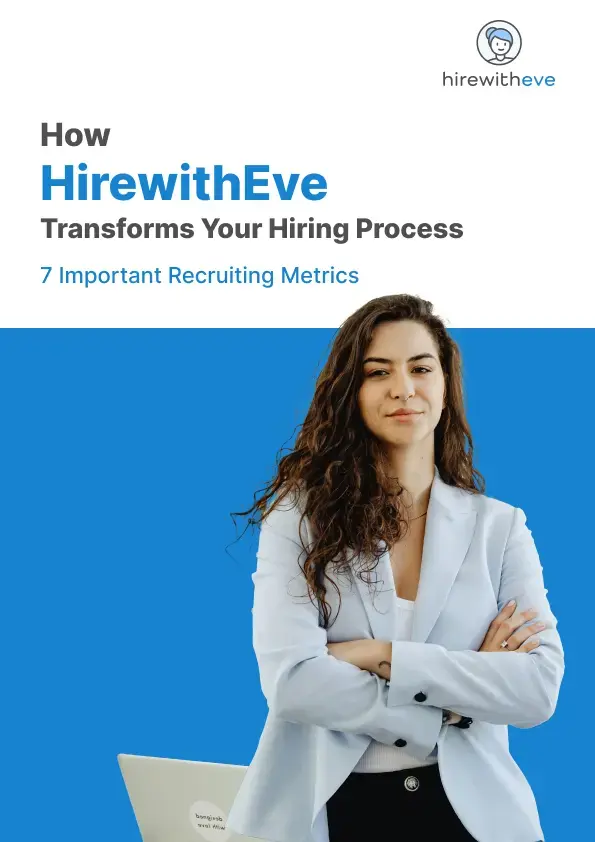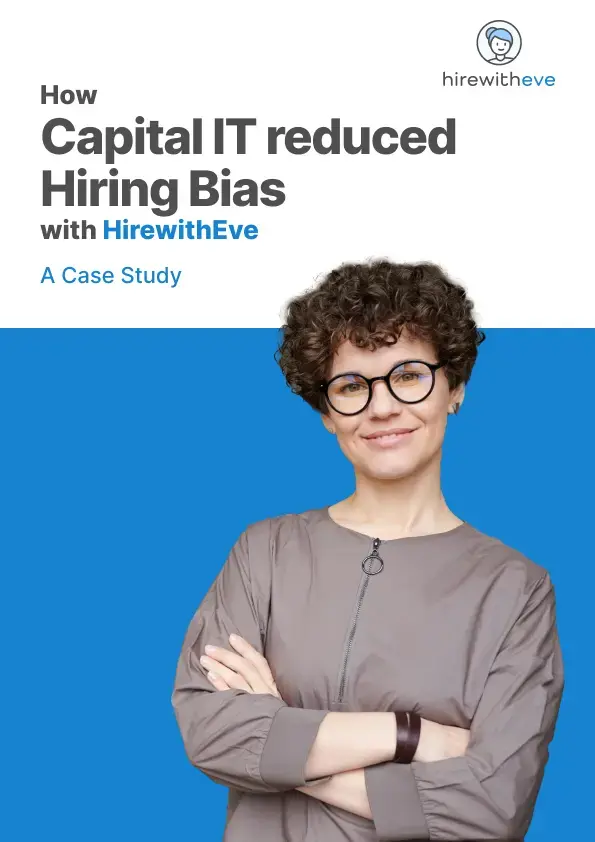Assessing Analytical Skills for Talent Acquisition

Assessing Analytical Skills for Talent Acquisition

Employees with strong analytical skills are invaluable assets to any organization. These skills enable individuals to make data-driven decisions, offer critical insights, and solve complex issues efficiently. However, identifying candidates with these capabilities during the hiring process can be challenging. This comprehensive guide will provide talent acquisition specialists and HR managers with the tools and knowledge to effectively assess analytical skills using structured interviews, pre-employment tests, and HirewithEve, the premier software for talent assessment.
Table of contents
What Are Analytical Skills and the Importance of Analytical Skills in the Workplace?
The Challenges of Assessing Analytical Skills
Best Practices for Evaluating Analytical Skills
Top Analytical Skills Interview Questions
Red Flags in Assessing Analytical Skills
Methods for Accurate Assessment of Analytical Skills
Structured Interviews vs. Unstructured Interviews
Implementing Pre-Employment Skills Tests
HirewithEve: The Perfect Solution for Analytical Skills Assessment
Conclusion
FAQs on Analytical Skills Assessment
What Are Analytical Skills and the Importance of Analytical Skills in the Workplace?
Analytical skills are a subset of critical thinking skills that allow individuals to process information, analyze data, identify patterns, and derive meaningful conclusions. Psychologists often refer to analytical thinking as the "pure brain power" upon which other cognitive abilities rest. Employees with high-level analytical skills are adept at breaking down complex data, contextualizing it, and presenting actionable insights and solutions.
In addition to data analysis, analytical skills encompass problem-solving abilities. For example, an employee might notice recurring UX issues in customer feedback, identify the root cause, and propose an effective solution. Such skills are crucial in various workplace scenarios, from improving processes to making strategic decisions.
Analytical skills are increasingly recognized as essential in modern workplaces. The US Department of Labor has identified analytical thinking as a key soft skill for the 21st century. Hiring employees with strong analytical skills offers several benefits:
Increased Efficiency: Analytical individuals focus on the most critical aspects of the business, enhancing overall efficiency.
Better Decision-Making: They gather data, develop logical solutions, and make decisions based on objective information.
Improved Prioritization: Analytical workers can evaluate tasks objectively, ensuring that high-priority items receive the necessary attention.
Versatility: These employees can adapt to changing circumstances and take on various roles as needed.
Stronger Problem-Solving: They can make effective decisions and take swift action to resolve issues.
Effective Research: Analytical thinkers dig deeper into data to draw meaningful conclusions, leading to better decision-making.
The Challenges of Assessing Analytical Skills
While the benefits of hiring analytically skilled employees are clear, assessing these skills can be difficult. Resumes and traditional interviews often fail to provide a complete picture of a candidate's analytical abilities. To address this challenge, it is essential to employ a multi-faceted approach that includes well-crafted interview questions, pre-employment skills tests, and structured interviews.
Best Practices for Evaluating Analytical Skills
To accurately assess a candidate's analytical skills, focus on the following best practices:
Ask the Right Questions: Use interview questions that require candidates to demonstrate their analytical thinking in real-life scenarios.
Use Skills Tests: Implement pre-employment skills tests to gain hard data on a candidate's capabilities.
Structured Interviews: Adopt a structured interview approach to ensure consistency and objectivity in the evaluation process.
Multiple Assessment Methods: Combine different assessment methods to get a comprehensive view of the candidate's skills.
Top Analytical Skills Interview Questions
Here are seven top examples of behavioral interview questions designed to assess analytical skills:
Describe a time when you had to solve a problem with limited information. How did you approach the situation?
This question evaluates the candidate's ability to think critically and make decisions with limited information. Look for a step-by-step approach and logical reasoning in their answer.
Sample Answer: "Faced with a sharp drop-off in complaints and bug reports for our e-commerce checkout system, I found and fixed a bug that was blocking feedback, allowing us to continue improving the platform."
What methods do you use to track performance metrics?
This question assesses the candidate's competency in establishing and implementing effective measurement systems. Look for how they find, track, and communicate data.
Sample Answer: "I track customer metrics using proprietary software, compiling these into weekly reports with actionable recommendations."
How do you ensure your metrics are accurate?
This question evaluates attention to detail and commitment to data accuracy. Look for their ability to validate and verify information.
Sample Answer: "I ensure metrics align with our visitor count, and if inconsistencies arise, I troubleshoot with our web developers."
When faced with a decision between two or three options, what criteria do you use to make your choice?
This question assesses decision-making skills and the ability to evaluate multiple options objectively.
Sample Answer: "I use decision matrices and consult with subject matter experts to weigh alternatives and make informed choices."
Tell me about a project where you exercised your analytical skills productively.
This question lets candidates demonstrate the practical application of their analytical skills.
Sample Answer: "After a social media faux pas, I recommended unscheduling posts and issuing an apology, which mitigated backlash and refocused on our value."
How do you determine the best first step for tackling a big-picture problem?
This question shows the candidate's ability to work backward from a problem, demonstrating an understanding of cause and effect.
Sample Answer: "I summarize the problem, identify stakeholders, and assemble a team to create an action plan."
Can you give an example of a time when you improved a workplace process?
This question highlights the candidate's ability to go from conceptual analysis to practical implementation.
Sample Answer: "I implemented an automated inspection system that increased efficiency by 52% and defect detection by 36%, improving customer satisfaction."
Red Flags in Assessing Analytical Skills
When assessing analytical skills, be on the lookout for these red flags:
Only Provides Big-Picture Answers: A candidate who cannot break down problems into smaller parts may lack true analytical skills.
Can't Identify Root Causes or Starting Points: Inability to work backward from data indicates weak analytical abilities.
Doesn't Ask Questions: Analytical thinkers should be curious and probing, asking questions to seek out patterns.
Can't Rationalize Decisions or Trends: Candidates should be able to explain the "why" behind their actions and decisions.
Shows Biased Thinking: Any form of bias can undermine analytical skills and decision-making.
Methods for Accurate Assessment of Analytical Skills
To assess analytical skills accurately, use a combination of the following methods:
Structured Interviews: Follow a set order of pre-prepared questions to ensure consistency and objectivity.
Pre-Employment Skills Tests: Implement skills tests to gain objective data on a candidate's analytical abilities.
Real-Life Scenarios: Use questions that place candidates in real-life situations to see how they apply their skills.
Multiple Sources: Combine interview responses, skills tests, and other assessments to get a comprehensive view of the candidate's capabilities.
Structured Interviews vs. Unstructured Interviews
Unstructured Interviews
Questions Asked on the Spot: Unstructured interviews are more conversational, with questions asked spontaneously.
No Set Order: Topics are approached in no particular order, making it hard to compare candidates objectively.
Qualitative Assessment: These interviews rely on open-ended conversations, leading to subjective evaluations.
Structured Interviews
Pre-Prepared Questions: Structured interviews use a set of pre-prepared questions, ensuring consistency.
Set Order: Topics are discussed in a specific order, making it easier to compare candidates.
Quantitative Assessment: Structured interviews allow for quantitative evaluation through specific benchmarks.
Promotes Objectivity: By removing bias and focusing on job-related factors, structured interviews provide a clearer view of a candidate's abilities.
Implementing Pre-Employment Skills Tests
Pre-employment skills tests are a valuable tool in assessing analytical skills. They provide hard data on a candidate's capabilities, complementing the insights gained from interviews. HirewithEve offers a range of custom skills tests designed to evaluate key elements of analytical thinking, including problem-solving, critical thinking, leadership, and communication skills.
Benefits of Pre-Employment Skills Tests
Objective Assessment: Skills tests provide objective data on a candidate's abilities, reducing bias in the hiring process.
Benchmarking: Establish benchmarks for analytical skills to compare candidates effectively.
Refined Job Descriptions: Use skills tests to refine job descriptions based on required skills rather than just experience.
HirewithEve: The Perfect Solution for Analytical Skills Assessment
HirewithEve is the ideal software for talent assessment, offering a comprehensive suite of tools to evaluate analytical skills accurately. With a growing library of over 400 tests, HirewithEve makes it easy to assess prospective hires' skills and aptitudes.
Features of HirewithEve
Custom Skills Tests: Tailor tests to assess specific skills required for your organization.
Comprehensive Reporting: Gain detailed insights into candidates' strengths and weaknesses.
User-Friendly Interface: Easy to navigate and use, making the assessment process seamless.
Benchmarking and Analytics: Establish benchmarks and analyze data to make informed hiring decisions.
Conclusion
Hiring employees with strong analytical skills is crucial for any organization's success. By using structured interviews, pre-employment skills tests, and HirewithEve, talent acquisition specialists and HR managers can accurately assess these skills and make informed hiring decisions. This comprehensive approach ensures that new hires are equipped to handle complex problems, make data-driven decisions, and contribute to the company's long-term growth.
FAQs on Analytical Skills Assessment
What does it mean to have strong analytical skills?
Strong analytical skills mean the ability to process information and data effectively, draw meaningful conclusions, and act on that information to solve problems and make informed decisions.
What is an example of analytical thinking?
An example of analytical thinking is identifying the root cause of a drop in performance metrics and taking steps to address the issue based on data analysis.
How do you demonstrate analytical skills in an interview?
Demonstrate analytical skills by providing specific examples of times you used these skills to solve problems, identify trends, or improve processes.
How can HirewithEve help in assessing analytical skills?
HirewithEve offers custom skills tests, comprehensive reporting, and benchmarking tools that provide objective data on candidates’ analytical abilities, making the assessment process more accurate and efficient.
Target Your Talent
Unlock tailored solutions for your recruitment and hiring needs with Eve Platform's extensive case study library.
Stay informed with daily updates on news, trends, and expert analysis tailored for HR professionals.
Subscribe now to enhance your HR expertise and excel in your role.
Free Resources

Transforming Hiring: 7 Key Recruiting Metrics
Enhancing recruitment processes with data-driven insights for better hiring outcomes.

Reducing Hiring Bias with Hirewitheve.
Utilizing Hirewitheve to combat bias and streamline recruitment processes effectively.

Hiring Detail-Oriented Candidates
HirewithEve enhances hiring by accurately assessing candidate's attention to detail-oriented.
